Science is spilling the truth about your dog in your bed and it is not what you expected.

Some people swear their dog belongs under the covers, others think it is chaos waiting to happen. New studies are pulling back the blanket on what really goes on when your dog claims pillow space. Turns out, the answer is not as simple as a yes or no. If you have ever wondered if this bedtime habit is helping or wrecking your life, the research just got interesting.
1. Sleep patterns shift more than you think.

As reported by Mayo Clinic researchers, dogs in the bed can actually change your sleep cycles, but not always in the way you expect. People tend to wake up more often but also feel emotionally calmer, which can cancel out the disrupted rest for some. Your REM cycle may be shorter while light sleep stretches longer.
People often adapt over time, making the initial adjustment phase the hardest. A surprising number of dog owners say their bodies learned to tune out paw stretches and bed shuffling altogether. That emotional boost from having a dog next to you often overrides the slight loss of deep sleep, which might explain why people keep doing it even when they know it interrupts their rest.
2. Dogs can keep allergies alive longer.
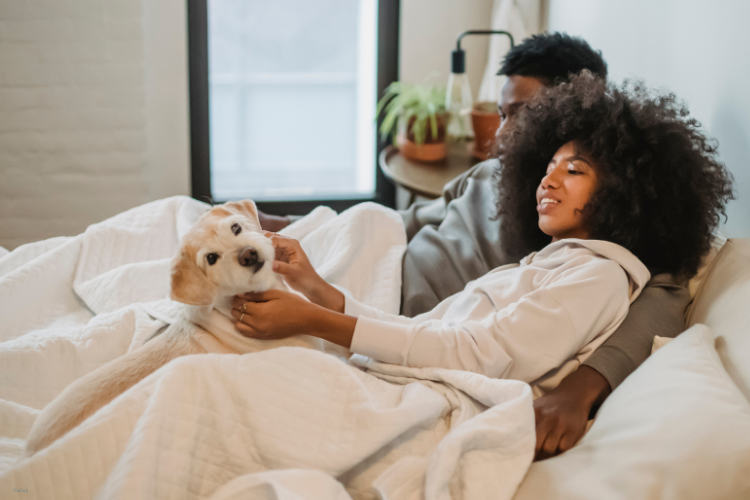
According to the American Lung Association, letting dogs into the bed can increase exposure to dander and other allergens, especially in homes with asthma or seasonal allergies. That cozy snuggle can mean waking up stuffy, sneezy, or with irritated skin. It is less about the dog itself and more about what they bring into the sheets.
Many owners end up using air purifiers and allergen-blocking bedding to keep symptoms at bay rather than banishing the dog. In some cases, allergy shots or simple grooming routines actually make co-sleeping possible without constant discomfort. People committed to their dogs often look for these middle-ground fixes before considering sleeping separately.
3. Anxiety levels respond in unpredictable ways.
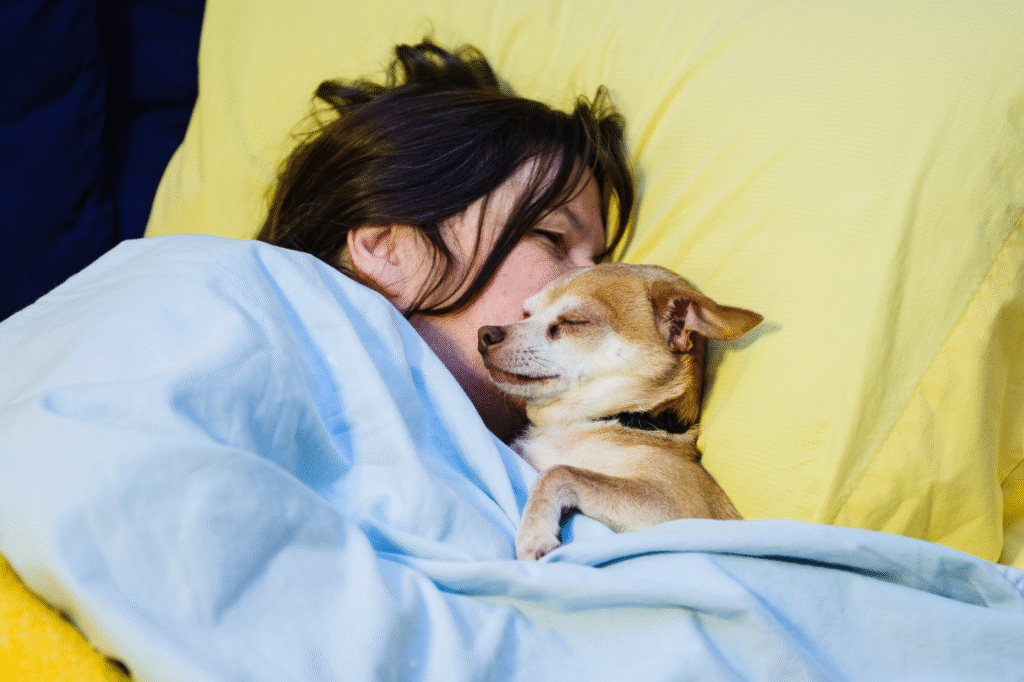
As stated by the Journal of Behavioral Medicine, sleeping with dogs can reduce anxiety for some and increase it for others. Those who crave physical closeness often feel calmer and safer. Others, however, become hyperaware of movement or noises and sleep more restlessly. It is not a universal emotional cure.
For those who experience calm, cortisol levels tend to drop, which can make falling asleep faster and staying asleep easier. People who are light sleepers, though, might lie awake listening to every sigh, stretch, and reposition. Personal temperament plays a bigger role than many expect, which is why this habit works wonders for some and feels like chaos for others.
4. Body temperature gets pushed to wild extremes.
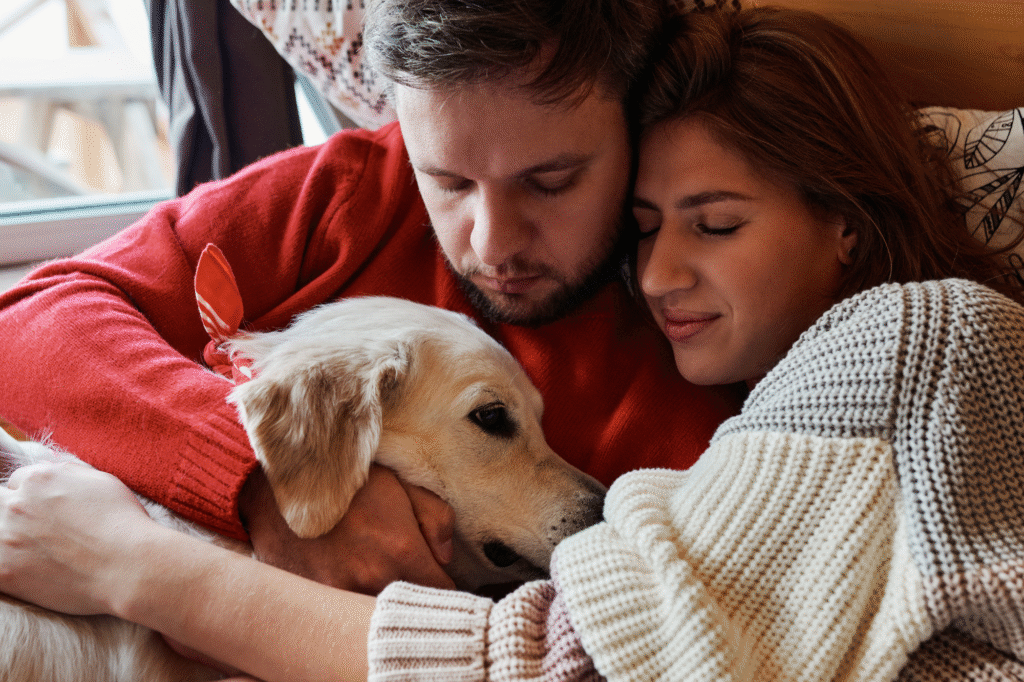
Dogs radiate heat differently than people, and when they curl up against you, it can push your body temperature up noticeably. For people who run cold at night, this feels like built-in climate control. For others, it becomes a reason to toss and turn while trying to cool down.
Interestingly, the breed and coat thickness play huge roles here. A hairless or short-coated dog might make the bed feel comfortable, while a thick-coated breed like a Husky can feel like sleeping next to a furnace. Some people even rotate sleeping arrangements seasonally, with dogs in bed for winter but kicked to the foot or floor in summer.
5. Bonding reaches levels you did not expect.
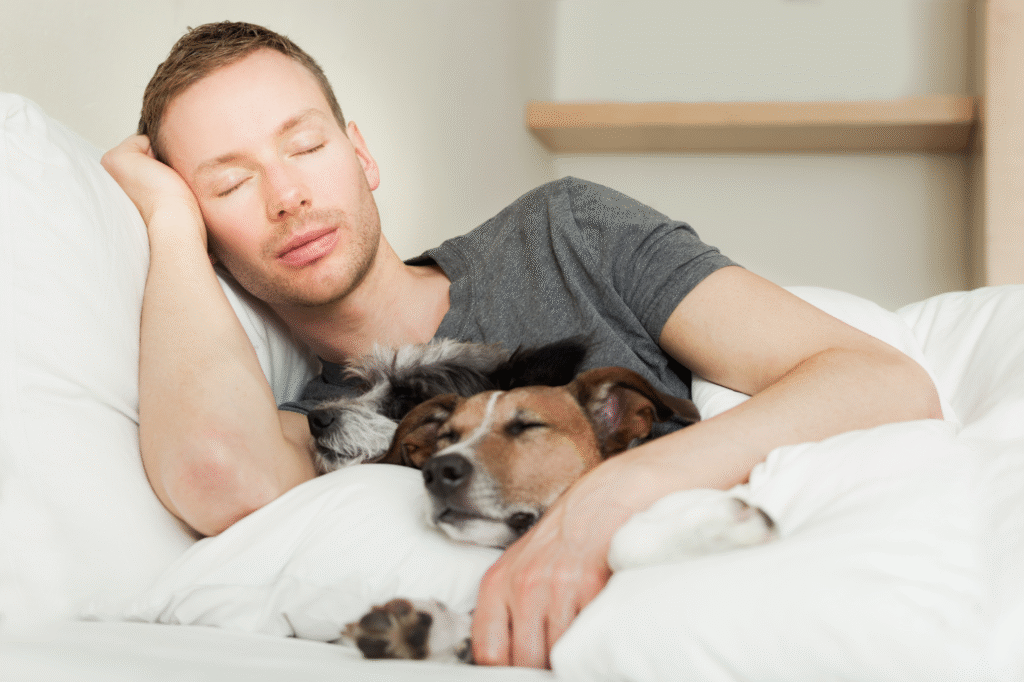
The shared act of sleeping together often deepens the human-dog connection beyond daily walks or playtime. Dogs tend to feel safer and more emotionally secure, which can lead to stronger obedience and less anxiety during the day. Owners report feeling a similar emotional bond that makes the pet feel more like family.
This type of bonding is not just emotional fluff; it shapes behavior and even health. Some research suggests it can lower human blood pressure and help dogs produce more oxytocin, the hormone linked to trust and attachment. The catch is that once you start, dogs often expect it every single night, which can be hard to reverse later.
6. Noise levels might catch you off guard.
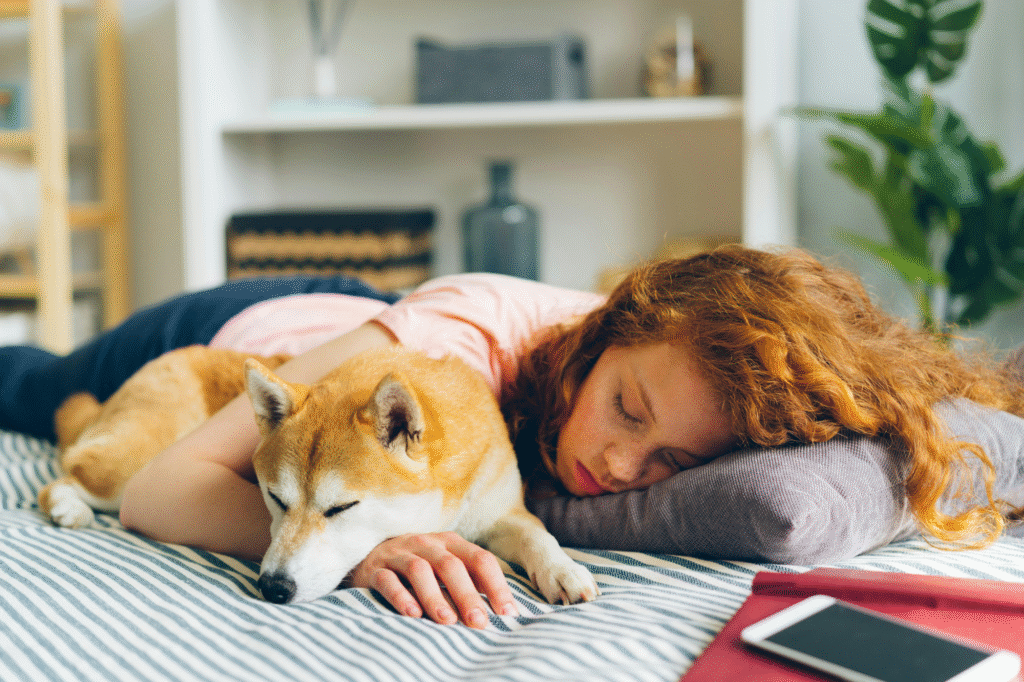
Dogs snore, grunt, and even dream-bark, and for light sleepers, that soundtrack can ruin a night fast. What feels cute during an afternoon nap can become irritating at 2 a.m. when a dog starts twitching mid-dream or lets out a surprise growl at a shadow on the wall.
While some people learn to tune it out the way they do with a fan or air conditioner, others never adapt. For them, even one restless night can spiral into feeling irritable or sluggish the next day. This is often the tipping point for people who eventually decide their dog belongs in their own bed or on the floor.
7. Personal space becomes a thing of the past.
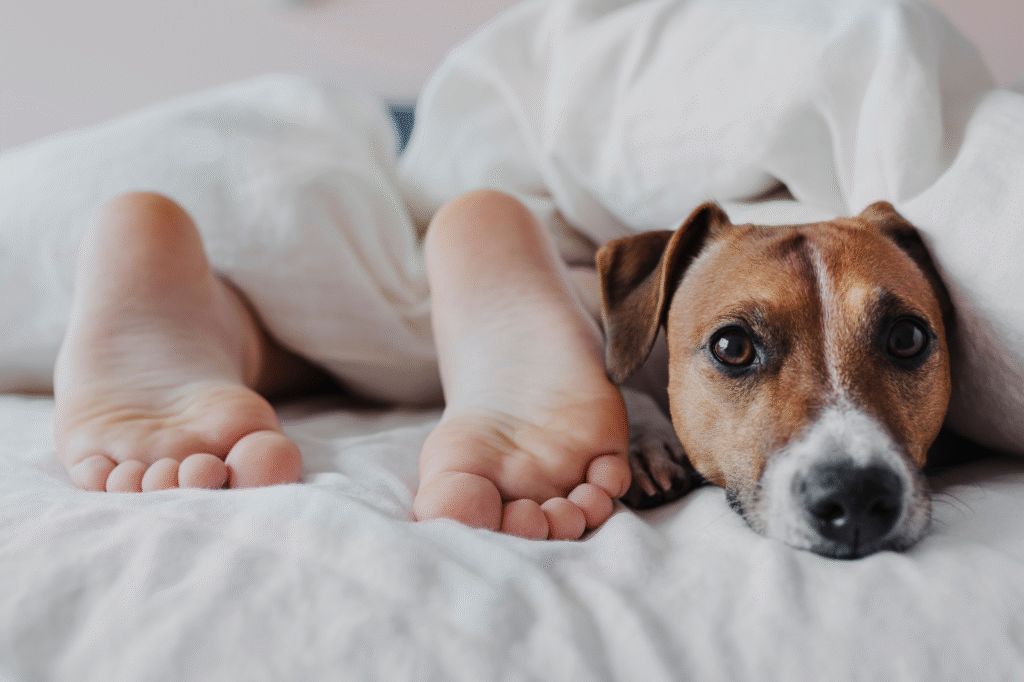
Dogs are notorious for claiming more space than you give them. That cute 30-pound pup somehow sprawls diagonally and pushes you to the edge of the mattress by morning. If you share your bed with a partner, the problem doubles.
Many dog owners end up upgrading mattress sizes or adopting weird sleeping positions to accommodate their pets. This works for some households, but for others, it leads to tension and less restful sleep. The dog may feel secure, but the humans sometimes feel like guests in their own bed.
8. The habit is harder to break than you think.
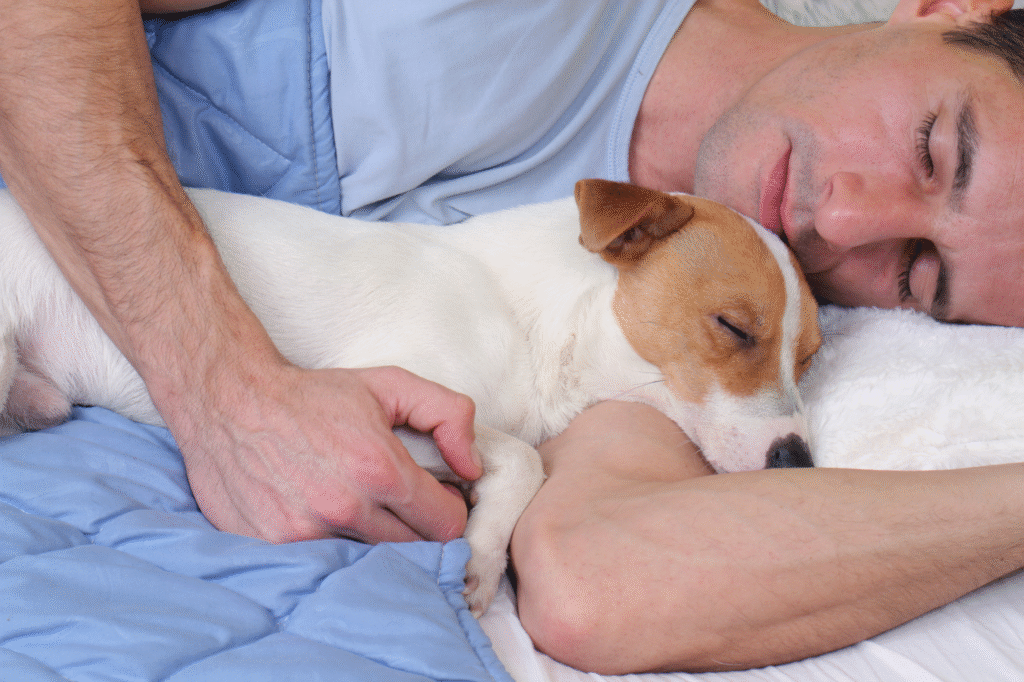
Once dogs get used to sleeping in bed, convincing them otherwise can turn into a full-scale battle. They scratch at doors, whine, or jump back in the moment you fall asleep. That sense of entitlement builds fast and can make retraining take weeks or even months.
People who allow co-sleeping temporarily—like during a storm or while traveling—often find the behavior sticks long after the reason is gone. For many, it becomes easier to just keep the arrangement going rather than fight nightly battles.
9. Hygiene issues sneak up on you.

Even well-groomed dogs track dirt, grass, and whatever their paws picked up during the day into bed. If your dog likes rolling in the yard or spends time around other animals, those invisible hitchhikers come along too. Sheets require more frequent washing, and sometimes even pillows or comforters need replacing sooner.
Owners who are diligent about paw cleaning and routine baths manage better, but it is still more work. For germ-conscious people or households with babies, this can feel like a breaking point despite loving their dogs.
10. Emotional comfort can outweigh all downsides.
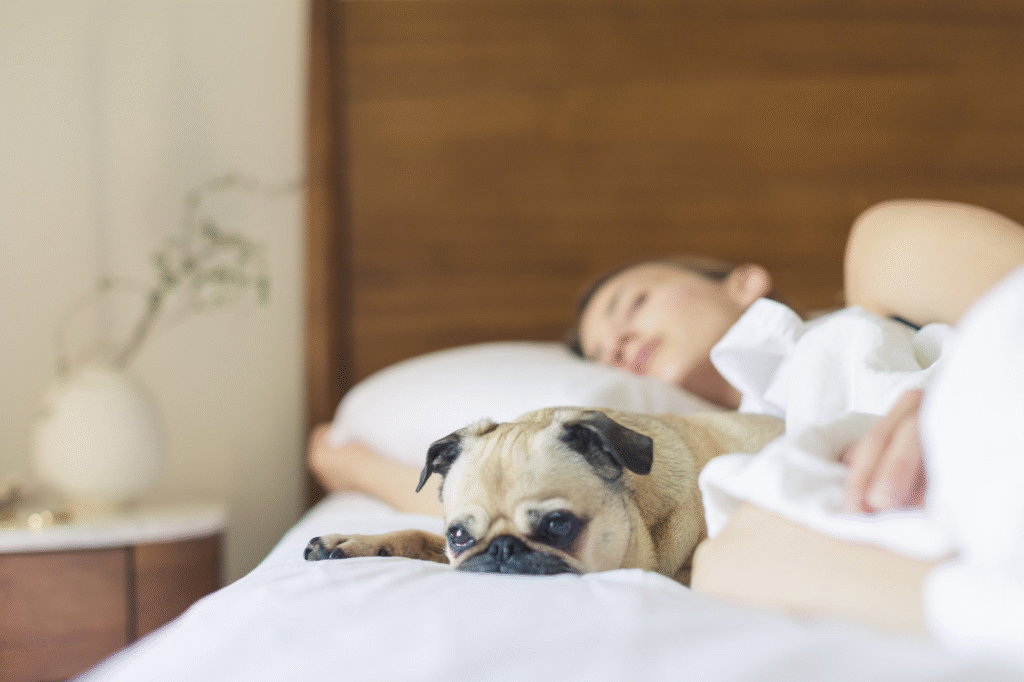
Despite the disruptions, space battles, and extra laundry, many people simply feel happier with their dog nearby at night. That emotional comfort can be powerful, offering security, warmth, and companionship unmatched by anything else.
For people who live alone or have high-stress jobs, having a dog in bed can act like an anchor, grounding them in a way little else does. It is why, even with all the evidence for and against, plenty of people will keep cuddling up under the same blanket every night.
